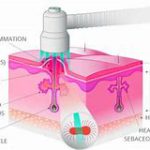Last Updated on 12 months by Francis
beneficial?
Negative ions are molecules that are negatively charged and are found in abundance in nature, particularly near waterfalls, thunderstorms, and oceans. There is a growing belief among some people that negative ions have potential health benefits such as improving mood, reducing stress, and boosting immunity. However, these claims are often debated, and the scientific evidence around the efficacy of negative ions on health is not conclusive. In this discussion, we will explore the potential benefits of negative ions on health and the scientific evidence to support or refute these claims.
Contents
The Basics: What Are Negative Ions?
When we hear the term “negative ions,” we may think of something harmful or dangerous. However, that couldn’t be further from the truth. In fact, negative ions are naturally occurring molecules that are found in the air around us, particularly in places with running water, such as waterfalls, beaches, and even after a thunderstorm. Negative ions are created when molecules gain an electron, giving them a negative charge. They are often referred to as “nature’s antidepressant” due to their potential mood-boosting effects.
How Do Negative Ions Affect Our Health?
Negative ions are believed to have several health benefits, including improved mood, increased energy levels, and reduced stress and anxiety. One of the primary ways they are thought to achieve these effects is through their ability to neutralize positively charged ions, also known as free radicals. Free radicals can damage our cells and contribute to various health problems, such as inflammation and oxidative stress. By neutralizing these ions, negative ions may help promote a healthier environment for our bodies to function in.
The Research: What Do Studies Say About Negative Ions?
While many people swear by the benefits of negative ions, the scientific research on their effects is still somewhat limited. However, some studies have suggested that they may have potential health benefits. For example, a 2007 study found that negative ion therapy helped reduce symptoms of seasonal affective disorder (SAD) in participants. Another study from 2013 found that negative ion exposure was associated with reduced anxiety and improved sleep quality in patients with chronic obstructive pulmonary disease (COPD).
Can Negative Ions Help With Respiratory Issues?
One area of interest for researchers is the potential for negative ions to improve respiratory health. While more research is needed, some studies have suggested that they may help reduce inflammation in the lungs and improve lung function. A 2016 study found that negative ion therapy improved lung function in patients with asthma, while another study from 2018 found that negative ion exposure reduced airway inflammation in mice.
Can Negative Ions Boost Our Immune System?
Another area of interest for researchers is the potential for negative ions to boost our immune system. While the research is still limited, some studies have suggested that negative ions may enhance our immune response by increasing the production of white blood cells. This could potentially help our bodies fight off infections and illnesses more effectively.
The Takeaway: Are Negative Ions Worth Pursuing?
While the scientific research on negative ions is still somewhat limited, there is some evidence to suggest that they may have potential health benefits. However, it’s important to keep in mind that they are not a cure-all, and more research is needed to fully understand their effects. Additionally, negative ions are not a substitute for other healthy lifestyle habits, such as exercise, a healthy diet, and getting enough sleep. If you are interested in trying negative ion therapy, be sure to speak with your healthcare provider first to see if it may be appropriate for you.
Negative Ions and Mental Health
In addition to their potential physical health benefits, negative ions may also have positive effects on mental health. A 2017 study found that negative ion exposure was associated with reduced symptoms of depression and anxiety in patients with major depressive disorder. Another study from 2018 found that negative ion exposure improved cognitive function and reduced symptoms of depression in elderly participants.
FAQs for the topic: are negative ions healthy?
What are negative ions?
Negative ions are molecules that have gained an electron, which gives them a negative charge. They are commonly found in natural settings such as near waterfalls, beaches, and forests. Negative ions can also be artificially produced through the use of air ionizers, which emit negative ions into the environment.
What are the health benefits of negative ions?
Negative ions are believed to have several health benefits, including improved air quality, reduced stress and anxiety, and increased energy levels. Some studies have also suggested that negative ions can help alleviate symptoms of depression and seasonal affective disorder (SAD).
How do negative ions improve air quality?
Negative ions can help purify the air by attaching to pollutants and neutralizing them. This process is known as air ionization or air ionization purification. Negative ions can also help remove allergens such as pollen, dust, and mold spores from the air.
Do negative ions have any side effects?
There are no known negative side effects of negative ions. However, some people may be sensitive to the increased levels of ozone that can be produced by air ionizers.
How can I increase the amount of negative ions in my environment?
You can increase the amount of negative ions in your environment by spending time near natural settings such as waterfalls, beaches, and forests. You can also use an air ionizer or air purifier to increase the levels of negative ions indoors.
Are negative ions a cure-all for health problems?
Negative ions are not a cure-all for health problems. While they may have some health benefits, they should not be considered a substitute for medical treatment for any underlying conditions. It is important to consult with a healthcare provider regarding any health concerns.





